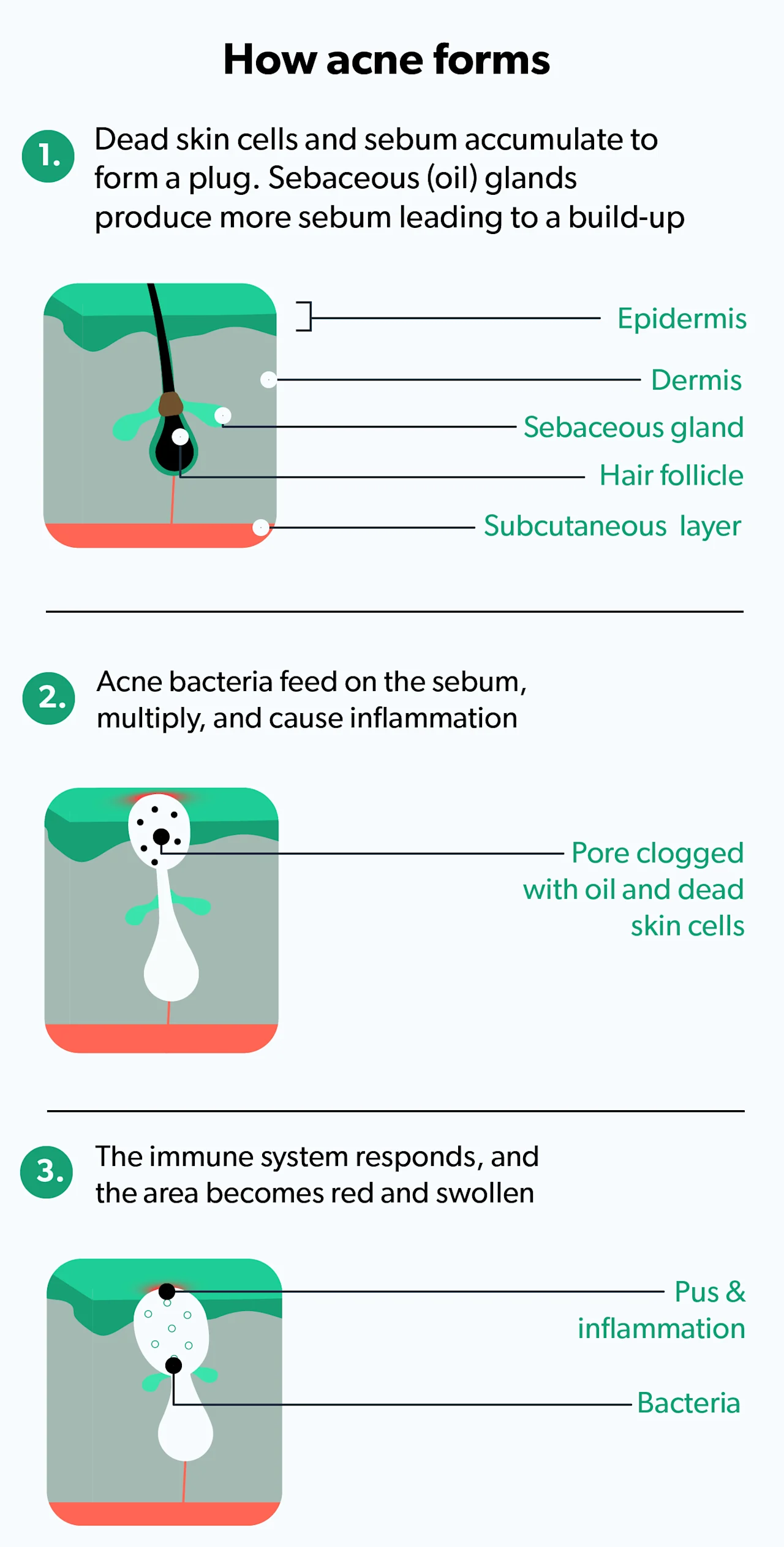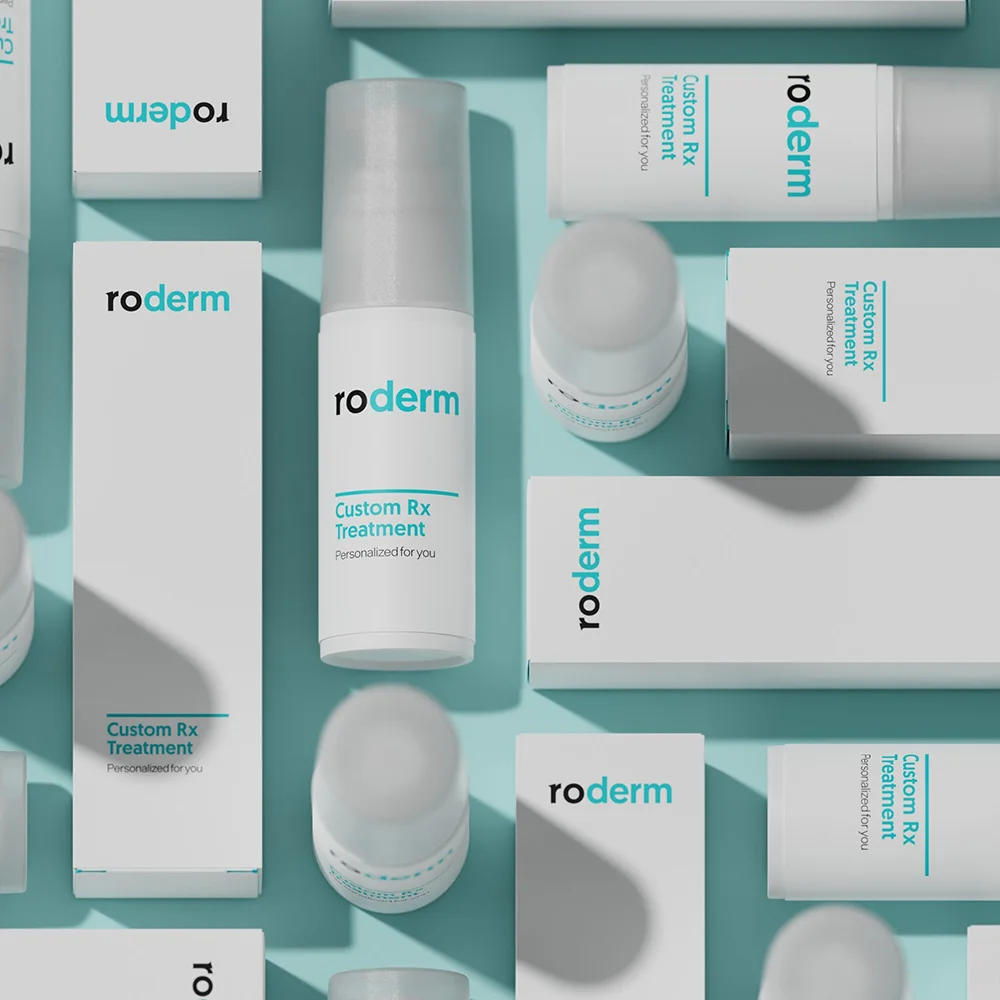Here's what we'll cover
Here's what we'll cover
If you've been struggling with pimples and can't seem to find relief, you're not alone. Acne affects millions of people in the United States. And while acne does mainly affect teens and young adults, plenty of older adults struggle with it as well. If you haven't found success with any over-the-counter acne treatments, you may be curious about trying a prescription drug called Accutane. Here's what you need to know.
What is Accutane?
Accutane is the brand name for the generic medication isotretinoin. It is in the retinoid class of medications (retinoids come from vitamin A) and was approved for severe treatment-resistance acne in 1982 by the U.S. Food and Drug Administration (FDA). Unlike other retinoids, which are topical (like tretinoin), Accutane is an oral medication. It's an effective therapy that helps with several of the main factors contributing to acne, like oil production, clogged pores, inflammation, and more (Pile, 2021).
Tretinoin Important Safety Information: Read more about serious warnings and safety info.
Accutane uses
Accutane is FDA-approved to treat a form of severe acne called recalcitrant nodular acne (which causes swollen, painful nodules on the skin) that has not been helped by other treatments, like antibiotics (Pile, 2021).
Like many medications, Accutane also has several “off-label” uses—these are conditions that isotretinoin is not FDA-approved to treat. Still, sometimes providers may choose to prescribe it for these purposes if they see fit. Examples of off-label uses include (Pile, 2021; Landis, 2020):
Severe cystic acne
Acne that is causing scarring
Moderate acne
Cutaneous T-cell lymphomas
Neuroblastoma
Prevention of squamous cell carcinoma (a type of skin cancer) in high-risk patients
How does Accutane work?
Accutane targets the underlying causes of acne. Acne forms due to your skin pores getting clogged with oil and dead skin cells, creating an inviting place for skin bacteria to grow and eventually leading to an inflammatory reaction and the characteristic “zit” or comedone (Leyden, 2017).
Accutane helps treat acne by shrinking the oil glands (sebaceous glands), preventing clogged pores, decreasing the growth of skin bacteria, and anti-inflammatory effects. During treatment, Accutane also reduces oil (sebum) production. Most people continue treatment until their acne clears; however, some people have acne relapses and need to pursue a second course of Accutane (Fallah, 2021).

It can take several weeks or more for Accutane to have its full effect, and it can make acne get worse at the beginning of treatment. Most people who take Accutane have a course of treatment that lasts for 15–20 weeks (Pile, 2021).
Side effects of Accutane
Like all medications, Accutane carries the potential for side effects, so it's important to talk with your healthcare provider and understand all the pros and cons before you take the medication.
Some of the most common side effects of Accutane include (Pile, 2021):
Chapped or dry lips (cheilitis)–occurs in approximately 90% of users
Dry skin
Itchy skin
Dry eyes
Dry nose
Accutane also commonly raises your triglycerides, a type of fat or lipid in your blood. Your healthcare provider may want to monitor your labwork while on treatment (Pile, 2021).
Other side effects include sun sensitivity (more susceptible to sunburns), thinning hair, and decreased night vision, nausea, vomiting, headaches, joint pain, and mental health issues (may cause depression or suicidal thoughts) (DailyMed, 2020).
Risks of Accutane
One serious complication of Accutane is its potential to cause severe pregnancy and birth problems. You should not take Accutane if you are pregnant or may become pregnant because there is a high risk that it can result in loss of the pregnancy or harm to the baby.
This potential compilation is so significant that the FDA has issued a black box warning (its most serious warning). The FDA classifies this drug as Pregnancy Category X, meaning that it has been shown to cause harm to the developing fetus and is contraindicated in people who are pregnant or who may become pregnant.
If you're thinking of taking Accutane for acne, you will need to first take a pregnancy test. The iPLEDGE program has been established to ensure that people who are pregnant don't take Accutane. This program also strives to prevent people from becoming pregnant while taking the medication. You can only get a prescription for Accutane if you're registered with iPLEDGE, have a prescription from a prescriber registered with iPLEDGE, and get the medication from a registered pharmacy iPLEDGE. You’ll also need to be on two forms of birth control while taking Accutane (Pile, 2021).
Cost of Accutane
Check with your insurance provider as many plans cover Accutane. Out-of-pocket, generic isotretinoin costs around $105. Brand name Accutane ranges from $88–$185 for a one-month supply (GoodRx, n.d.).
Alternatives to Accutane for treating acne
While Accutane is a highly effective acne therapy, it's usually considered a last resort treatment because of its potential to cause serious side effects. Most medical professionals will recommend that you try a variety of other acne treatments before trying Accutane.
Accutane is a very strong oral retinoid, but many topical retinoids are also considered effective acne treatments. Examples of topical retinoids include adapalene (brand name Differin), tazarotene (brand name Tazorac), and tretinoin (brand name Retin-A) (Leyden, 2017).
Benzoyl peroxide is a safe and effective treatment for acne, often used as first-line therapy. It works by attacking the skin bacteria (C. acnes) that can lead to acne. You can get benzoyl peroxide over-the-counter in washes, creams, and gels. It can improve your acne in as little as five days after starting it. Depending on the severity of your acne, you may want to combine it with other treatments (Zaenglein, 2018).
Many topical antibiotics inhibit the growth of the bacteria C. acnes, and they also reduce inflammation. Some of the most popular topical antibiotics used to target acne are erythromycin and clindamycin. Providers sometimes use oral antibiotics like doxycycline to help with acne. Birth control pills and spironolactone have also been shown to effectively treat acne in some people (Zaenglein, 2018).
DISCLAIMER
If you have any medical questions or concerns, please talk to your healthcare provider. The articles on Health Guide are underpinned by peer-reviewed research and information drawn from medical societies and governmental agencies. However, they are not a substitute for professional medical advice, diagnosis, or treatment.
DailyMed. (2020). Isotretinoin capsules. Retrieved on Oct 22, 2021 from https://dailymed.nlm.nih.gov/dailymed/drugInfo.cfm?setid=1cf11710-f966-4529-8e08-02175f588bca
Fallah, H., & Rademaker, M. (2021). Isotretinoin in the management of acne vulgaris: practical prescribing. International Journal of Dermatology, 60 (4), 451–460. doi: 10.1111/ijd.15089. Retrieved from https://pubmed.ncbi.nlm.nih.gov/32860434/
GoodRx.com. (n.d.). Accutane. Retrieved on Oct 22, 2021 from https://www.goodrx.com/accutane
Landis M. N. (2020). Optimizing isotretinoin treatment of acne: update on current recommendations for monitoring, dosing, safety, adverse effects, compliance, and outcomes. American Journal of Clinical Dermatology , 21 (3), 411–419. doi:10.1007/s40257-020-00508-0. Retrieved from https://pubmed.ncbi.nlm.nih.gov/32107726/
Leyden, J., Stein-Gold, L., & Weiss, J. (2017). Why topical retinoids are mainstay of therapy for acne. Dermatology and therapy , 7 (3), 293–304. doi: 10.1007/s13555-017-0185-2. Retrieved from https://pubmed.ncbi.nlm.nih.gov/28585191/
Pile, H. D. & Sadiq, N. M. (2021). Isotretinoin. [Updated 2021 May 10]. In: StatPearls [Internet]. Retrieved on Oct 22, 2021 from https://www.ncbi.nlm.nih.gov/books/NBK525949/
Zaenglein, A. L. (2018). Acne vulgaris. The New England Journal of Medicine , 379 (14), 1343–1352. doi: 10.1056/NEJMcp1702493. Retrieved from https://pubmed.ncbi.nlm.nih.gov/30281982/










